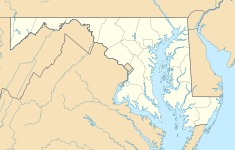| Longwood | |
|---|---|
| The Dependency[2] | |
| Location | 3188 Roxbury Mills Road Glenwood, Maryland 21738[1] |
| Coordinates | 39°17′00″N 77°02′00″W / 39.28333°N 77.03333°W |
| Built | c. 1780 |
| Architectural style(s) | Georgian |
| Owner | Walnut Springs Nursery Inc.[1] |
Longwood Plantation was a slave plantation in Glenwood in Howard County, Maryland, United States.[1]
The Longwood plantation was started by Dr. Gustavus Warfield (1784-??), son of Dr. Charles Alexander Warfield, a doctor and wealthy landowner in Howard County, where he owned an estate called Bushy Park.[3] Gustavus graduated in 1806 from the University of Pennsylvania and returned to Howard County to practice medicine with his father. The elder Warfield died intestate in 1813, and Gustavus eventually took possession of part of his father's estate.[1]
In the 1820s, he built a manor house, part of which stands today.[1] The name Longwood originates with the Longwood House where Napoleon was exiled in Saint Helena. Rather than the typical practice of naming estates after land patents which would have included "Ridgley's Range" or "Ridgley's Great Park".[4] Warfield practiced medicine and ran his forced-labor farm in the house; he would keep patients in a loft above his office if they were unfit to travel. It feature numerous outbuildings and a smokehouse.
The Warfields built a graveyard for people they enslaved; it sits to the south of the house.[5] In 1860, Robert E. Lee visited Longwood to visit his wife's first cousin, George Washington Parke Custis Peter. He returned to visit in July 1870.[6]
A will made out in 1865 by Warfield's wife, Mary Thomas Warfield, bequeathes various parts of the property and the people she enslaved to her daughters.[1]
In April 2024, plans were announced to open Howard County’s first-ever destination public garden at Longwood. The garden will be overseen by the county’s Department of Recreation & Parks and a newly formed Public Garden Focus Group.[7]
- ^ a b c d e f Schmidt, Jon (July 2, 2013). "Maryland Historical Trust Determination of Eligibility Form" (PDF). Maryland Historical Trust. Retrieved April 23, 2024.
- ^ "Maryland Inventory of Historic Properties". Maryland Historical Trust. Retrieved April 23, 2024.
- ^ "Sen. Tydings drops by". The Baltimore Sun. April 2, 2015.
- ^ Stein, Charles Francis Jr. (1972). Origin and History of Howard County Maryland (First ed.). Howard County Historical Society. p. 258.
- ^ Howard County Historic Society. Images of America Howard County. p. 87.
- ^ Howard County Historical Society. Images of America, Howard County. p. 19.
- ^ "Howard County Executive Calvin Ball Unveils Location of First-Ever Public Garden". Howard County (Press release). April 23, 2024. Retrieved April 24, 2024.
